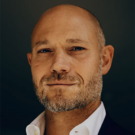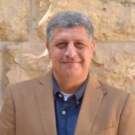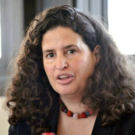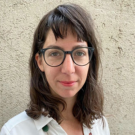Speakers

Omri Boehm
Associate Professor and Chair of Philosophy
The New School for Social Research

Amira Hass
Correspondent for the Occupied Territories
Haaretz

Michael Karayanni
The Bruce W. Wayne Chair in International Law
The Hebrew University of Jerusalem

Noga Tarnopolsky
Correspondent covering Israel and Palestine

Mairav Zonszein
Senior Analyst on Israel-Palestine
International Crisis Group
Moderator
About the Webinar
On March 23, 2023, Arab Center Washington DC (ACW) organized a webinar titled “Israel’s Judicial Overhaul: Domestic and International Implications.” Panelists were Omri Boehm, Associate Professor and Chair of Philosophy at the New School for Social Research; Amira Hass, Haaretz correspondent for the occupied territories; Michael Karayanni, Bruce W. Wayne Chair in International Law, the Hebrew University in Jerusalem; Noga Tarnopolsky, a Correspondent covering Israel and Palestine; and Mairav Zonszein, Senior Analyst on Israel-Palestine for International Crisis Group. Khalil E. Jahshan, ACW Executive Director, moderated the event.
Michael Karayanni discussed the legal dimensions of the proposed judicial changes for Palestinian citizens of Israel.
- Speaking of the packing of courts in Israel, Karayanni said, “In the past ten years, the ministers of justice have been packing the Israeli judiciary with more conservative judges and justices.”
- On the reluctance of Palestinian citizens of Israeli to join the protests against the proposed judicial reforms, Karayyani stated, “We do not have much to lose relative to what exists anyway…I don’t see [these changes] as being revolutionary as they are being presented…because I do exist in a state where there is this override [of laws], there is this judicial packing.”
Omri Boehm covered the issue of the judicial proposals in the context of Israeli democracy as it is practiced today.
- Discussing the concept of Israel as a Jewish and democratic state, Boehm said, “A Jewish state is not truly democratic, neither for Arabs nor for Jews. Democracy depends on the rule of law, and the rule of law depends on complete civil equality.”
- Discussing the need to write a constitution to make things clearer for everyone, Boehm stated that drafting a constitution is a great idea, but that, “It will be an awful one if it were to be written in the same mindset [that is prevalent today]…. Constitutions are often not documents of emancipation, but weapons of oppression. A constitution that is written as Israel occupies the Palestinians will…without doubt, belong to the latter category.”
Amira Haas covered the impact of the current crisis in Israel on the occupied Palestinian territories, on Israeli settlements, and on settler violence.
- Asserting that Israel has never given up on its settler colonial project, Haas said, “The worsening of Palestinian conditions in Gaza and the West Bank is inbuilt in the system….The legislation, the so-called reforms, is not the reason for the worsening [of these conditions].”
- Regarding Israeli settlements, Haas stated that the settlements are a way to fragment Palestinian society, and argued that, “Israel kept enlarging the settlement areas to the point that they are now a special, integral part of Israel itself. An Israeli who drives from Jerusalem to the northern part of the country through the Jordan Valley cannot notice he or she is driving in the occupied territories.”
Mairav Zonszein highlighted the gravity of the threat posed by Israel’s current government and its judicial changes to Palestinians, and also discussed other alarming aspects of the far-right government’s rise to power and a “new paradigm” in Israel’s relations with the world, and with the US in particular.
- On US-Israel relations, Zonszein said, “Israel is openly saying to the US, ‘We don’t respect previous agreements.’…Anybody paying attention knows that Israel doesn’t do that anyway. But here it’s doing it with such gall and openness, it’s pushing the envelope to the point where the US has to act….If there were ever a time for the US to act on Israeli actions, it is today with this government.”
- On relations between Israel and both the US government and American Jews, Zonszein stated, “The American Jewish and US alliance with Israel is based on…shared democratic values, the interests of the Jewish community and the connection it has, and then also their regional interests that the US and Israel share militarily and politically. And on all these issues I think right now you have serious challenges and questions.”
Noga Tarnopolsky drew from her experience as a correspondent covering Israel’s protests and the government actions that gave rise to them, challenging the language of judicial “reform” to characterize the government’s actions instead as a seizure of power.
- On the nature of the government’s proposed judicial changes, Tarnopolsky stated, “This is an attempt to illicitly seize power. And I do feel that that’s the correct way to understand why so many Israelis are so enraged and what has made this dam burst. It’s an attempt to collapse the entire framework, which was eminently criticizable to begin with.”
- On the means that the Israel government is using to achieve its aims, Tarnopolsky said, “What this government is doing is using legislative tools…in an attempt to change the entire box, the entire rule of the game, and be able to hold onto power.”
Featured image credit: Shutterstock/Noa Ratinsky

